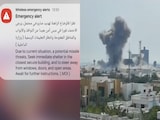- The Hayli Gubbi volcano erupted in Ethiopia for the first time in nearly 12,000 years
- Ash plumes traveled at 100-120 km/h, reaching India and affecting multiple flights
- India's aviation body advised airlines to avoid ash-affected areas and report any engine issues
A volcano erupted in northern Ethiopia for the first time in nearly 12,000 years on Sunday, with winds moving at a speed of 100-120 km/h carrying the ash plumes to many countries, including India.
The Hayli Gubbi volcano in the Afar region of Ethiopia erupted on Sunday morning, and the ash clouds entered Delhi, which is already struggling with the toxic air, late last night, affecting flight operations.
The ash plumes, thousands of feet up in the atmosphere, first entered Gujarat and drifted towards Rajasthan, Delhi, Haryana, and Punjab.
The India Meteorological Department (IMD) said the ash clouds are drifting towards China and will move away from Indian skies by 7:30 pm.
"High-level winds carried the ash cloud from Ethiopia across the Red Sea to Yemen and Oman and further over the Arabian Sea towards western and northern India," the IMD said in a statement.
Aviation Body's Advisory As Hayli Gubbi Volcano Erupts
India's aviation body issued an advisory, asking airlines to strictly avoid published volcanic ash-affected areas and flight levels and adjust flight planning, routing, and fuel considerations based on the latest advisories.
The Directorate General of Civil Aviation (DGCA) asked the airlines to immediately report any suspected ash encounter, including engine performance anomalies or cabin smoke/odour.
Air India, IndiGo, and SpiceJet were among the airlines that were affected.
Air India said it cancelled eleven flights as it carried out "precautionary checks" on the aircraft that had flown over certain geographical locations after the Hayli Gubbi volcanic eruption.
Flights from Newark to Delhi, New York to Delhi, Dubai to Hyderabad, Doha to Mumbai, Dubai to Chennai, Dammam to Mumbai, Doha to Delhi, Chennai to Mumbai, and Hyderabad to Delhi were among those cancelled.
"We sincerely regret the inconvenience caused to passengers due to this unforeseen situation beyond our control. The safety of our passengers and crew remains our highest priority," the airline wrote on X.
IndiGo said it was "fully prepared" with all necessary precautions to ensure safe and reliable operations.
“Following the recent eruption of the Hayli Gubbi volcano in Ethiopia, ash clouds are reported to be drifting towards parts of western India. We understand that such news may cause concern, and we want to reassure you that your safety remains our highest priority. Our teams are closely tracking the situation in coordination with international aviation bodies. We are fully prepared with all necessary precautions to ensure safe and reliable operations,” IndiGo posted on X.
A weather expert said the ash plume mostly consists of sulphur di-oxide with low to moderate concentrations of volcanic ash.
“It will not impact AQI (air quality index) levels, but it will impact SO2 levels in the hills of Nepal, the Himalayas and the adjoining Terai belt of Uttar Pradesh, as some of the material will bump into the hills and later move into China,” the expert wrote on X.
Hayli Gubbi Volcano Erupts In Ethiopia
The Hayli Gubbi volcano erupted in the Afar region of Ethiopia, sending thick plumes of smoke up to 14 kilometres into the sky and covering many villages in ash.
The volcano, which rises about 500 metres in altitude, sits within the Rift Valley, a zone of intense geological activity where two tectonic plates meet.
Videos on social media, which NDTV could not immediately verify, showed a thick column of white smoke rising.
The Afar region is prone to earthquakes, and a resident said he heard a loud sound and described it as a shock wave.
“It felt like a sudden bomb had been thrown with smoke and ash,” a resident told news agency AP.
The Smithsonian Institution's Global Volcanism Program said Hayli Gubbi has had no known eruptions during the Holocene, which began around 12,000 years ago at the end of the last Ice Age.















